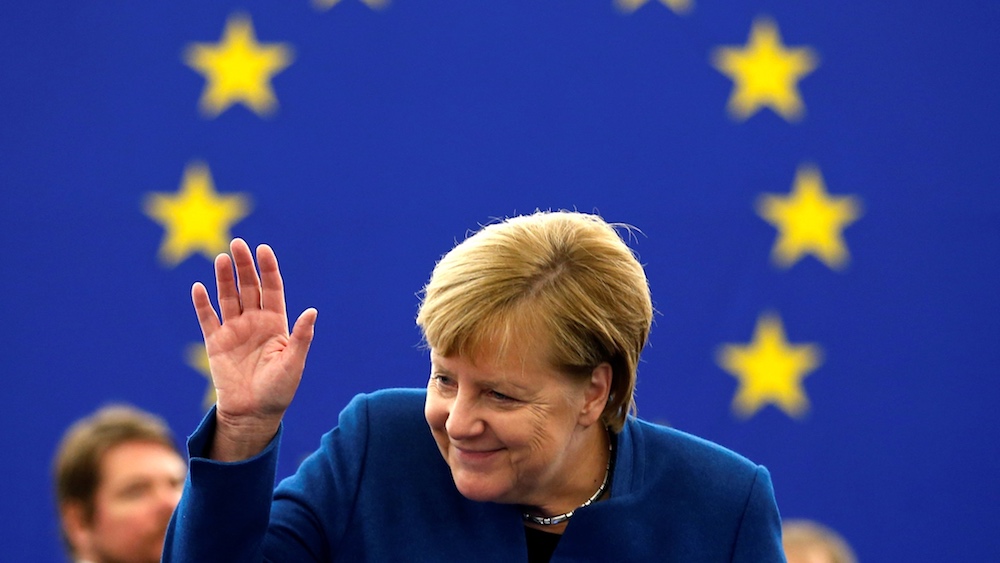The German chancellor indicated to the European Parliament she will push for a shift away from decades of Atlanticist foreign policy in Germany, backing France’s call for a European army even as Trump blasts the idea.
“Europe needs to grasp its destiny more firmly in its own hands, because the times where we could rely unreservedly on others are over.”
There was little doubt in the European Parliament chamber on Tuesday about who Angela Merkel was talking about as she delivered her opening speech in a debate on the future of Europe. Even as she spoke, US President Donald Trump was delivering a diatribe against France on Twitter, sparked by recent comments by Emmanuel Macron.
Last week The Wall Street Journal quoted the French president as saying the EU needs its own army to protect it from potential threats from “Russia, China and even the United States of America.” The Elysee later clarified that this specific quote was referring to cyber threats, but the sentiment remained largely the same. This infuriated Trump, who has spent the week attacking Macron, France, and the European Union.
“Emmanuel Macron suggests building its own army to protect Europe against the US, China, and Russia,” he tweeted Tuesday afternoon. “But it was Germany in World Wars One & Two – How did that work out for France? They were starting to learn German in Paris before the US. came along. Pay for NATO or not!”
Given that Merkel’s speech to the parliament came just two hours after these comments, some expected her to back off on some of her prepared remarks. But instead she explicitly supported Macron’s call for a European army, showing mettle and European solidarity in the face of Trump’s threats.
“A common European army would show the world that there would never again be war in Europe,” she said. Her remarks drew loud applause from the chamber but also some boos from euroskeptics, particularly from British members. “I am really pleased about this,” she replied. “I come from a parliament too, I won’t be put off.”
Skeptical France
France has long been skeptical of the US-dominated NATO and has for years pushed for Europe to establish a military capability free from the United States. Germany has until now not embraced this idea, fearful that it would weaken NATO.
Merkel was at pains in her speech to stress that “this is not an army against NATO, it can be a good complement to NATO.” But she said that the time has come for a European army.
While France has not allowed US troops to be stationed in its territory, there are still 40,000 American soldiers stationed in Germany today, compared to 170,000 total active German military personnel. There are 10,000 US soldiers stationed in the United Kingdom.
Some proponents of a European army say such deployments are not only humiliating but also present a security threat in the age of Trump. A European army, they say, would lead to a European capability for self-defense that would allow countries to ask the American troops to leave.
Macron said in an interview with CNN on Sunday that he agrees with Trump that Europe needs to spend more on its militaries, but it should spend that money on its own military and its own hardware rather than funding NATO and buying equipment from America.
European Finish
Merkel’s speech was part of a series of debates over the past several months held with the 28 leaders of EU member states on the future of Europe. She used the occasion to signal her priorities for her legacy. Having announced last month that she will step down from her party’s leadership and not seek another term, she is now focusing on securing her legacy in history as her leadership comes to a close.
From her speech, it would appear she wants that legacy to be a European one. She is prepared to hug Macron close in the face of threats from Trump, as she illustrated in the ceremony marking the 100-year anniversary of Armistice Day earlier this week.
She used her speech to decry the rising tide of “nationalism and egoism.” Though not named, her targets were clear – Trump and the leaders of Hungary, Poland, and Italy.
“Tolerance is the soul of Europe and an essential basic value of the European idea”, she said in Strasbourg. The challenges Europe faces can only be tackled successfully if Europe acts united and if we “treat the interests and needs of others as our own.”
“Solidarity is based on tolerance and this is Europe’s strength. It is part of our common European DNA and it means overcoming national egoisms”. She had particularly targeted criticism for Italy’s populist government, which is preparing to implement a budget that does not live up to EU commitments to balance the books. “If you try to solve problems by making new debts, you disregard commitments made and question the foundations for strength and stability of the eurozone,” she said.
She finished with a plea for support for the European project, and a signal that she will defend the EU as her country enters into uncertain political territory with her departure.
“Europe is our best chance for peace, prosperity, and a good future. We must not let this chance slide; we owe this to ourselves and to past and future generations. Nationalism and egoism must never have a chance to flourish again in Europe. Tolerance and solidarity are our future. And this future is worth fighting for”, she concluded.
Though Macron has been frustrated with German reticence to embrace his ambitious European reform plans since he was elected last year, the chancellor’s speech this week may signal that she is ready to join hands in the waning months of her leadership.







